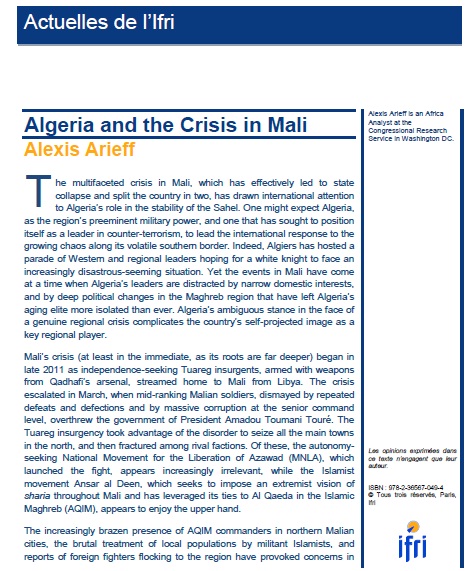Algeria and the Crisis in Mali

The multifaceted crisis in Mali, which has effectively led to state collapse and split the country in two, has drawn international attention to Algeria’s role in the stability of the Sahel. One might expect Algeria, as the region’s preeminent military power, and one that has sought to position itself as a leader in counter-terrorism, to lead the international response to the growing chaos along its volatile southern border.
Indeed, Algiers has hosted a parade of Western and regional leaders hoping for a white knight to face an increasingly disastrous-seeming situation. Yet the events in Mali have come at a time when Algeria’s leaders are distracted by narrow domestic interests, and by deep political changes in the Maghreb region that have left Algeria’s aging elite more isolated than ever. Algeria’s ambiguous stance in the face of a genuine regional crisis complicates the country’s self-projected image as a key regional player.
Mali’s crisis (at least in the immediate, as its roots are far deeper) began in late 2011 as independence-seeking Tuareg insurgents, armed with weapons from Qadhafi’s arsenal, streamed home to Mali from Libya. The crisis escalated in March, when mid-ranking Malian soldiers, dismayed by repeated defeats and defections and by massive corruption at the senior command level, overthrew the government of President Amadou Toumani Touré. The Tuareg insurgency took advantage of the disorder to seize all the main towns in the north, and then fractured among rival factions. Of these, the autonomy-seeking National Movement for the Liberation of Azawad (MNLA), which launched the fight, appears increasingly irrelevant, while the Islamist movement Ansar al Deen, which seeks to impose an extremist vision of sharia throughout Mali and has leveraged its ties to Al Qaeda in the Islamic Maghreb (AQIM), appears to enjoy the upper hand.
The increasingly brazen presence of AQIM commanders in northern Malian cities, the brutal treatment of local populations by militant Islamists, and reports of foreign fighters flocking to the region have provoked concerns in the region and in Western capitals that northern Mali could become a launching pad for transnational terrorist attacks. Some additionally fear that the ideology that ostensibly motivates Ansar al Deen and AQIM could gain currency beyond Mali’s borders. Meanwhile, Mali’s political class and the Economic Community of West African States (ECOWAS) have struggled to reconstitute any semblance of an effective government in Bamako.

Available in:
Regions and themes
ISBN / ISSN
Share
Download the full analysis
This page contains only a summary of our work. If you would like to have access to all the information from our research on the subject, you can download the full version in PDF format.
Algeria and the Crisis in Mali
Related centers and programs
Discover our other research centers and programsFind out more
Discover all our analysesGabon: Has an — Almost — Exemplary Transition Produced a New Political Model?
In two rounds of voting, on September 27 and October 11, 2025, the citizens of Gabon elected the members of both their local councils and the new national assembly. This marked almost the final stage of political transition, little more than two years after the coup d’état that had overthrown the more than five decades old dynastic regime of the Bongos — Omar, the father, who died in office in 2009, and then his son Ali, who is now in exile.
Claiming "The People": Youth Booms, Ailing Authoritarians and "Populist" Politics in Kenya, Uganda, and Tanzania
This study analyses the emergence of so-called “populist” political tendencies in three East African countries: Kenya, Uganda and Tanzania. It builds its analysis on a wider discussion of the term “populism”, its use and applicability in (eastern) African settings before going on to examine the drivers of three cases of populism: William Ruto’s 2022 election victory in Kenya and the “Hustler Nation”; Bobi Wine’s opposition to Yoweri Museveni in Uganda; and John Magufuli highly personal style of government in Tanzania.
The Contradictory Impacts of Western Sanctions on Economic Relations between Russia and Sub-Saharan Africa
How does Russia maintain economic ties with Africa despite Western sanctions? An analysis of investments, trade, and the circumvention strategies deployed by Moscow.
The Revenue Sources Sustaining Sudan’s Civil War. Lessons for the year 2023
Wars require money and resources, and often, most conflicts involve controlling sources of income and supply lines or denying them to enemies. This has been the case in Sudan’s past conflicts and is again as the civil war—between the Sudan Armed Forces (SAF), commanded by General Abdelfattah al-Burhan, and the paramilitary Rapid Support Forces (RSF), commanded by General Mohammed Hamdan Daglo “Hemedti” —has sunk into a protracted conflict.









